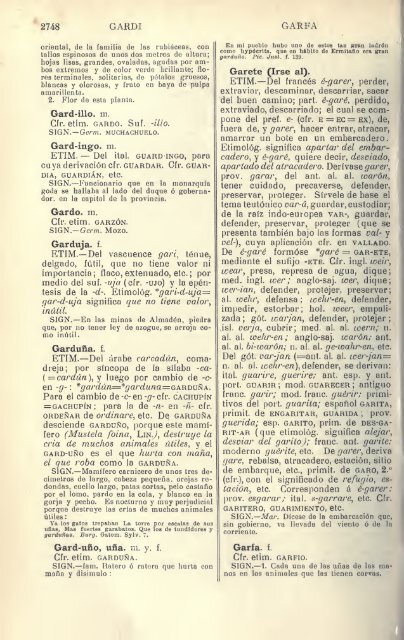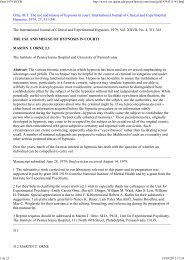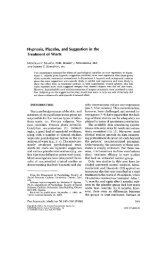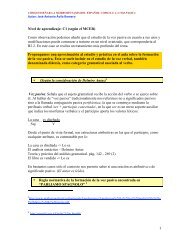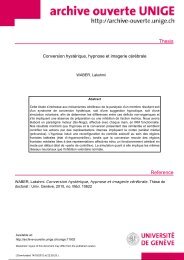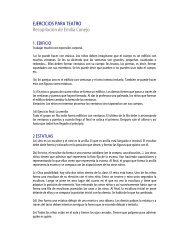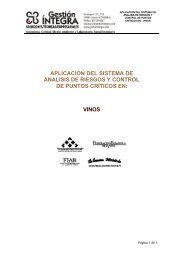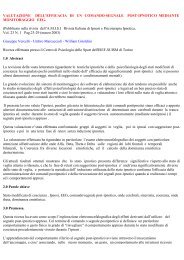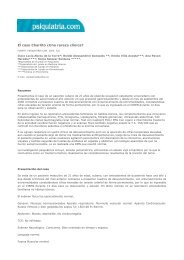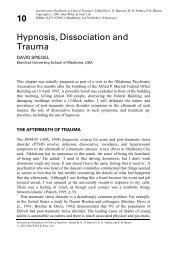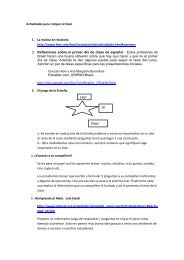Diccionario etimológico comparado de la lengua castellana
Diccionario etimológico comparado de la lengua castellana
Diccionario etimológico comparado de la lengua castellana
Create successful ePaper yourself
Turn your PDF publications into a flip-book with our unique Google optimized e-Paper software.
2748 GARDI GARFA<br />
oriental, <strong>de</strong> <strong>la</strong> familia <strong>de</strong> <strong>la</strong>s rubiáceas, con<br />
tallos espinosos <strong>de</strong> unos dos metros <strong>de</strong> altura;<br />
hojas lisas, gran<strong>de</strong>s, ova<strong>la</strong>das, agudas por ambos<br />
extremos y <strong>de</strong> color ver<strong>de</strong> bril<strong>la</strong>nte; flores<br />
terminales, solitarias, <strong>de</strong> pétalos gruesos,<br />
b<strong>la</strong>ncas y olorosas, y fruto en baya <strong>de</strong> pulpa<br />
amarillenta.<br />
2. Flor <strong>de</strong> esta p<strong>la</strong>nta.<br />
Gard-illo. m.<br />
Gfr. etim. gardo. Suf. -illo.<br />
SIGN.— Gcrm. muchachuelo.<br />
Gard-ingo. m.<br />
ETIM. — Del ital. guardingo, para<br />
cuya <strong>de</strong>rivación cfr. GUARDAR. Cfr. guardia,<br />
GUARDIÁN, etc.<br />
SIGN.—Funcionario que en <strong>la</strong> monarquía<br />
goda se hal<strong>la</strong>ba al <strong>la</strong>do <strong>de</strong>l duque ó gobernador,<br />
en <strong>la</strong> capital <strong>de</strong> <strong>la</strong> provincia.<br />
Gardo, m.<br />
Gfr. etim. garzón.<br />
SIGN.— Germ. Mozo.<br />
Garduja. f.<br />
ETÍM.— Del vascuence gari, tenue,<br />
<strong>de</strong>lgado, fútil, que no tiene valor ni<br />
importancia; f<strong>la</strong>co, extenuado, etc.; por<br />
medio <strong>de</strong>l suf. -vja (cfr. -ujo) y <strong>la</strong> epéntesis<br />
<strong>de</strong> <strong>la</strong> -d-. Etimológ. *gari-d-uja=^<br />
gar-d-uja significa que no tiene valor,<br />
inútil.<br />
SIGN.— En <strong>la</strong>s minas <strong>de</strong> Almadén, piedra<br />
que, por no tener ley <strong>de</strong> azogue, se arroja como<br />
inútil.<br />
Garduña, f.<br />
ETIM.— Del árabe carcadún, comadreja;<br />
por síncopa <strong>de</strong> <strong>la</strong> sí<strong>la</strong>ba -ca-<br />
{ =cardún), y luego por cambio <strong>de</strong> -cen<br />
-g- : *gardán=*garduna=GARD\jÑA.<br />
Para el cambio <strong>de</strong> -c- en -(/-cfr. cachupín<br />
= gachupín; para <strong>la</strong> <strong>de</strong> -n- en -ñ- cfr.<br />
ORDEÑAR <strong>de</strong> ordinare, etc. De garduña<br />
<strong>de</strong>scien<strong>de</strong> garduño, porque este mamífero<br />
(Muste<strong>la</strong> foina, LiN.y', <strong>de</strong>struye <strong>la</strong><br />
cria <strong>de</strong> muchos animales útiles, y el<br />
GARD-uÑo es el que hurta con maña,<br />
el que roba como <strong>la</strong> garduña.<br />
SIGN.— Mamífero carnicero <strong>de</strong> unos tres <strong>de</strong>címetros<br />
<strong>de</strong> <strong>la</strong>rgo, cabeza pequeña, orejas redondas,<br />
cuello <strong>la</strong>rgo, patas cortas, pelo castaño<br />
por el lomo, pardo en <strong>la</strong> co<strong>la</strong>, y b<strong>la</strong>nco en <strong>la</strong><br />
gorja y pecho. Es nocturno y muy perjudicial<br />
porque <strong>de</strong>struye <strong>la</strong>s crías <strong>de</strong> muchos animales<br />
útiles:<br />
Ya los gatos trepaban La torre por esca<strong>la</strong>s <strong>de</strong> sus<br />
uñas, Mas fuertes garabatos. Que los <strong>de</strong> tundidores y<br />
garduñas. Burg. Gatom. Sylv. 7.<br />
Gard-uño, uña. ni. y. f.<br />
Gfr. etim. garduña.<br />
SIGN.— fam. Ratero ó ratera que hurta con<br />
maña y disimulo :<br />
—<br />
En mi pueblo hubo uno <strong>de</strong> estos tan gran <strong>la</strong>drón<br />
como hypócrita, que en ta&bito <strong>de</strong> Ermitaño era gran<br />
garduño. Pie. Just. f. 139.<br />
Garete (Irse al).<br />
ETIM.— Del francés é-garer, per<strong>de</strong>r,<br />
extraviar, <strong>de</strong>scaminar, <strong>de</strong>scarriar, sacar<br />
<strong>de</strong>l buen camino; part. é-garé, perdido,<br />
extraviado, <strong>de</strong>scarriado; el cual se compone<br />
<strong>de</strong>l pref. e- (cfr. e = ec = ex), <strong>de</strong>,<br />
fuera <strong>de</strong>, y garer, hacer entrar, atracar,<br />
amarrar un bote en un embarca<strong>de</strong>ro.<br />
Etimológ. significa apartar <strong>de</strong>l embarca<strong>de</strong>ro,<br />
y é-garé, quiere <strong>de</strong>cir, <strong>de</strong>sviado,<br />
apartado <strong>de</strong>l atraca<strong>de</strong>ro. Derivase garer,<br />
prov. garar, <strong>de</strong>l ant. al. al. warón,<br />
tener cuidado, precaverse, <strong>de</strong>fen<strong>de</strong>r,<br />
preservar, proteger. Sírvele <strong>de</strong> base el<br />
tema teutónico var-á, guardar, custodiar;<br />
<strong>de</strong> <strong>la</strong> raíz indo-europea var-, guardar,<br />
<strong>de</strong>fen<strong>de</strong>r, preservar, proteger (que se<br />
presenta también bajo <strong>la</strong>s formas val- y<br />
vel-), cuya aplicación cfr. en val<strong>la</strong>do.<br />
De é-garé formóse *garé = gar-ete,<br />
mediante el sufijo -ete. Cfr. ingl. weir,<br />
wear, presa, represa <strong>de</strong> agua, dique;<br />
med. ingl. wer ; anglo-saj. wer, dique;<br />
wer-ian, <strong>de</strong>fen<strong>de</strong>r, protéjer, preservar;<br />
al. wehr, <strong>de</strong>fensa ; wehr-en, <strong>de</strong>fen<strong>de</strong>r,<br />
impedir, estorbar; hol. iceer, empali-<br />
¡<br />
zada ; gót. warjan, <strong>de</strong>fen<strong>de</strong>r, protéjer<br />
isl. verja, cubrir; med. al. al. wern; n.<br />
al. al. wehr-en; anglo-saj. warón; ant.<br />
al. al. bi-warón; n. al. al. ge-wahr-en, etc.<br />
Del gót. var-Jan (=ant. al. al. wer-/an=<br />
n. al. oi. wehr-en), <strong>de</strong>lenáer, se <strong>de</strong>rivan:<br />
ital. guariré, guerire; ant. esp. y ant.<br />
port. guarir; mod. guarecer ; antiguo<br />
franc. garir; mod. franc. guérir; primitivos<br />
<strong>de</strong>l port. guarita; español garita,<br />
primit. <strong>de</strong> engaritar, guarida ; prov.<br />
guerida; esp. garito, prim. <strong>de</strong> <strong>de</strong>s-ga-<br />
RiT-AR (que etimológ. significa alejar,<br />
<strong>de</strong>sviar <strong>de</strong>l garito); franc. ant. garite;<br />
mo<strong>de</strong>rno guérite, etc. De garer, <strong>de</strong>riva<br />
gare, rebalsa, atraca<strong>de</strong>ro, estación, sitio<br />
<strong>de</strong> embarque, etc., primit. <strong>de</strong> garó, 2.°<br />
(cfr.), con el significado <strong>de</strong> refugio, estación,<br />
etc. Correspon<strong>de</strong>n a é-garer:<br />
prov. esgarar ; ital. s-garrare, etc. Cfr.<br />
GARITERO, GUARIMIENT0, etC.<br />
SIGN. Mar. Dícese <strong>de</strong> <strong>la</strong> embarcación que,<br />
sin gobierno, va llevada <strong>de</strong>l viento ó <strong>de</strong> <strong>la</strong><br />
corriente.<br />
Garfa, f.<br />
Cfr. etim. garfio.<br />
SIGN.—1. Cada una <strong>de</strong> <strong>la</strong>s uñas <strong>de</strong> <strong>la</strong>s manos<br />
en los animales que <strong>la</strong>s tienen corvas.<br />
;


